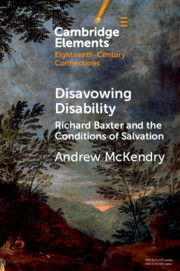Primary Sources
Adams, T. The Happines of the Church, London, 1619.
The Agreement of Divers Ministers of Christ in the County of Worcester, London, 1656.
Barclay, R. The Possibility and Necessity of the Inward Immediate Revelation of the Spirit of God, London, 1686.
Bates, W. Sermons Preach’d on Several Occasions, London, 1693.
Baxter, R. Additional Notes on the Life and Death of Sir Matthew Hale, London, 1682.
Baxter, R. An Answer to Mr. Dodwell and Dr. Sherlocke, London, 1682.
Baxter, R. Aphorismes of Justification, London, 1649.
Baxter, R. An Apology for the Nonconformists Ministry, London, 1681.
Baxter, R. A Breviate of the Life of Margaret, London, 1681.
Baxter, R. A Call to the Unconverted, London, 1658.
Baxter, R. Catholick Theologie, London, 1675.
Baxter, R. Certain Disputations of Right to Sacraments, London, 1658.
Baxter, R. The Certainty of the Worlds of Spirits, London, 1691.
Baxter, R. Christian Concord, London, 1653.
Baxter, R. A Christian Directory, London, 1673.
Baxter, R. Church Concord, London, 1691.
Baxter, R. Confirmation and Restauration, London, 1658.
Baxter, R. The Cure of Church-Divisions, London, 1670.
Baxter, R. “The Cure of Melancholy and Overmuch-Sorrow by Faith and Physick.” In Annesley, S. (ed.), A Continuation of Morning-Exercise Questions (263–304). London, 1683.
Baxter, R. Directions and Perswasions to a Sound Conversion, London, 1658.
Baxter, R. Directions for Weak Distempered Christians, London, 1669.
Baxter, R. The Duty of Heavenly Meditation, London, 1671.
Baxter, R. An End of Doctrinal Controversies, London, 1691.
Baxter, R. The English Nonconformity, London, 1689.
Baxter, R. Die ewige Ruhe der Heiligen, Cassel, 1684.
Baxter, R. Five Disputations of Church-Government and Worship, London, 1659.
Baxter, R. Gildas Salvianus, London, 1656.
Baxter, R. Gods Goodness Vindicated, London, 1671.
Baxter, R. The Grand Debate, London, 1661.
Baxter, R. The Humble Petition, London, 1652.
Baxter, R. The Life of Faith in Three Parts, London, 1670.
Baxter, R. The Mischiefs of Self-Ignorance, London, 1662.
Baxter, R. More Reasons for the Christian Religion, London, 1672.
Baxter, R. The Nature and Immortality of the Soul, London, 1682.
Baxter, R. The Nonconformists Plea for Peace, London, 1679.
Baxter, R. Obedient Patience, London, 1683.
Baxter, R. A Petition for Peace, London, 1661.
Baxter, R. The Poor Man’s Family Book, London, 1674.
Baxter, R. Reliquiae Baxterianae, London, 1696.
Baxter, R. Richard Baxter’s Dying Thoughts, London, 1683.
Baxter, R. Rich. Baxters Apology, London, 1654.
Baxter, R. Rich. Baxter’s Review of the State of Christian’s Infants, London, 1676.
Baxter, R. The Right Method for a Settled Peace of Conscience, London, 1653.
Baxter, R. The Saints Everlasting Rest, London, 1650.
Baxter, R. Schism Detected in Both Extreams, London, 1684.
Baxter, R. A Sermon of Judgement, London, 1655.
Baxter, R. Sermon sur l’Évangile de saint Matthieu, Paris, 1664.
Baxter, R. A Treatise of Death, London, 1660.
Baxter, R. A Treatise of Self-Denyall, London, 1659.
Baxter, R. The True and Only Way of Concord of all the Christian Churches, London, 1680.
Baxter, R. A True Believers Choice and Pleasure, London, 1680.
Baxter, R. True Christianity, London, 1655.
Baxter, R. Two Disputations of Original Sin, London, 1675.
Baxter, R. Two Treatises Tending to Awaken Secure Sinners, London, 1696.
Baxter, R. Universal Redemption, London, 1694.
Baxter, R. Wehkomaonganoo asquam Peantogig … ussowesu Mr. Richard Baxter, Cambridge, MA, 1664.
Boswell, J. The Life of Samuel Johnson, 2 vols., London, 1791.
Bunyan, J. The Acceptable Sacrifice, London, 1689.
Bunyan, J. A Defence of the Doctrine of Justification, London, 1672.
Bunyan, J. The Pilgrim’s Progress, London, 1678.
Bunyan, J. The Pilgrim’s Progress … The Second Part, London, 1684.
Covell, W. A Just and Temperate Defence, London, 1603.
Downame, G. The Covenant of Grace, London, 1631.
Edwards, J. The Plague of the Heart, Cambridge, UK, 1665.
Eyre, W. Vindiciae justificationis gratuitae, London, 1654.
Ferguson, R. A View of an Ecclesiastick in his Socks & Buskins, London, 1698.
Fletcher, J. The Historie of the Perfect-Cursed-Blessed Man, London, 1628.
Fowler, E. The Design of Christianity, London, 1671.
Gataker, T. The Joy of the Just, London, 1623.
Hallywell, H. The Sacred Method of Saving Humane Souls, London, 1677.
Jerome, S. The Haughty Heart Humbled, London, 1628.
The Life & Death of That Pious, Reverend … Mr. Richard Baxter, London, 1692.
Love, C. The Zealous Christian, London, 1653.
Milton, J. “Sonnet XVI.” In Carey, J. and Fowler, A. (eds.), The Poems of John Milton (329–330). London: Longmans, 1968.
Morris, T. Thomas Morris to Richard Baxter, November 1, 1687, DWL/RB/2/5.140, Dr. Williams’s Library, London.
Owen, J. Moderation a Vertue, London, 1683.
Owen, J. The Principles of the Doctrine of Christ, London, 1645.
Owen, J. Salus Electorum, Sanguis Jesu, London, 1648.
Prynne, W. The Church of Englands Old Antithesis to New Arminianisme, London, 1629.
Prynne, W. A Quenche-Coale, London, 1637.
Rutherford, S. A Survey of the Spirituall Antichrist, London, 1648.
Saltmarsh, J. Reasons for Unitie, Peace, and Love, London, 1646.
Savoy Meeting. A Declaration of the Faith and Order Owned and Practiced in the Congregational Churches in England, London, 1658.
Sober and Serious Considerations Occasioned by the Death of His Most Sacred Majesty, King Charles II, London: John Leake, 1685.
Taylor, J. Deus Justificatus, London, 1656.
Taylor, J. Symbolon Theologikon, London, 1674.
Tillotson, J. Several Discourses of Repentance, London, 1700.
Tillotson, J. Several Discourses viz. Of the Great Duties of Natural Religion, London, 1697.
Twain, M. “Advice to Youth.” In Neider, C. (ed.), The Complete Essays of Mark Twain (564–566). Garden City: Doubleday, 1963.
Ussher, J. A Body of Divinitie, London, 1645.
Wallis, J. Truth Tried, London, 1643.
Walwyn, W. The Power of Love, London, 1643.
Westminster Assembly. The Humble Advice of the Assembly of Divines, London, 1646.
Whichcote, B. Select Sermons of Dr. Whichcot, London, 1698.
Whitehead, G. The Light and Life of Christ, London, 1668.
Wilkins, J. A Discourse Concerning the Gift of Prayer, London, 1651.
Womock, L. Arcana Dogmatum Anti-Remonstrantium, London, 1659.
Yates, J. Gods Arraignement of Hypocrites, Cambridge, UK, 1615.
[Young, S. ] Vindiciæ Anti-Baxterianæ, London, 1696.



